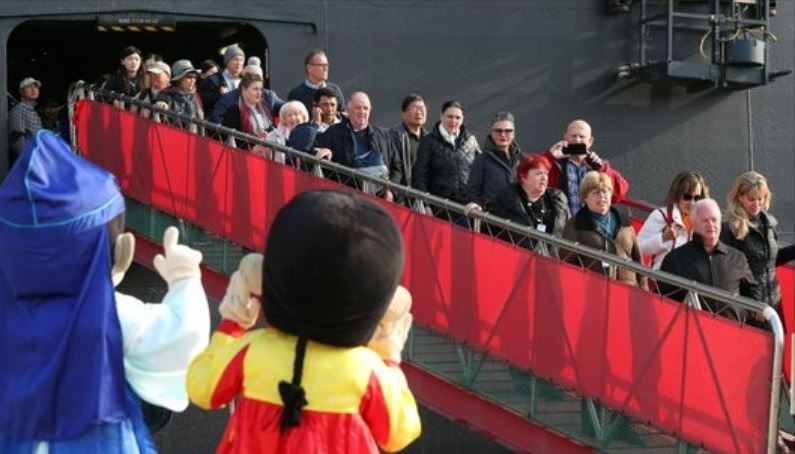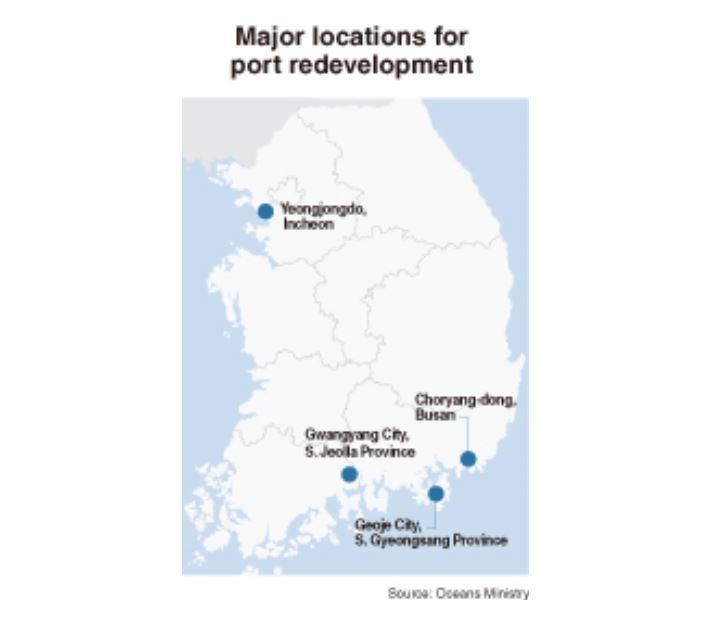SEJONG -- Earlier this year, South Korea pledged to foster “smart harbors” across the country as part of a move in a variety of sectors preparing for the coming era of the “fourth industrial revolution.”
The futuristic harbors will likely be equipped with state-of-the-art technologies such as artificial intelligence, the internet of things and robotics, according to the Ministry of Oceans and Fisheries.
Officials said the project’s focus will be 31 harbors designated for trade and 29 for domestic logistics.

Cruise tourists get off a ship anchored at a temporary dock in Incheon in February, two months before the opening of the Incheon Cruise Terminal in the city’s Songdo district. (Yonhap)
While the smart harbor project will be pushed on a mid- and long-term basis, construction for port redevelopment has already been underway in some regions -- a prerequisite step for the AI-equipped facilities.
“The current redevelopment project refers to building new infrastructure or pushing for landscaping around the harbors in addition to remodeling the existing facilities, aimed at creating higher added value,” said a ministry official.
Adding that more than 13 harbors will undergo (or are undergoing) the redevelopment, he hinted that the Korean project will look to learn from overseas cases.
Such models include Darling Harbor in Sydney, Port of Valencia in Spain, the District of Minato Mirai 21 in Yokohama, Japan, and Port of Miami in Florida.
Port of Miami is the best case, becoming the hub of port of calls for cruise ships on Caribbean trip routes. Through development for decades, it has the capacity of allowing 10 cruise ships to be anchored at the dock simultaneously. In addition, fashionable hotels and a shopping-oriented district have been built around the port.
Port of Miami is reaping earnings of more than $20 million per annum by attracting some 1 million cruise tourists.
Among Korea’s major redevelopment construction projects underway are Yeongjongdo in Incheon, Gwangyang Port in South Jeolla Province, Geoje Gohyeon Port in South Gyeongsang Province and Busan North Port.
Redevelopment of Geoje Gohyeon Port has been dubbed the “Maritime Multifunctional City – Geoje Big Island,” which is drawing particularly wide attention both from the public and private sector among those on three sides of the peninsula.
The project will classify four districts: marine cultural tour, multifunctional harbor, public facilities and multifunctional downtown.
The marine cultural tour district will involve large retail chains, a market square and a business square, while the multifunctional harbor district will have a marina, a cruise terminal, business hotels and a convention center.
In September 2018, the ministry held an opening ceremony for a cruise-only terminal at Busan North Port in the city’s Yeongdo-gu. It allocated 5.3 billion won ($4.5 million) out of its budget of 89.6 billion won for improvements to the Busan and Busan North ports.
Additionally, the redevelopment project for Busan North Port looks to the cases of Hong Kong and Singapore, where various cultural, global-oriented facilities will be fostered by 2030.
In Incheon, the project is renovating facilities and introducing new ones like maritime leisure and a park around the harbor.
The case in Gwangyang Port in South Jeolla Province is focused on building a futuristic energy hub to generate clean energy for better harbor conditions.

(Graphic by Han Chang-duck/The Korea Herald)
Meanwhile, the Oceans Ministry has unveiled a list of harbors to handle exports and imports in the era of the fourth industrial revolution.
They include Gyeongin, Incheon, Daesan, Pyeongtaek-Dangjin, Boryeong, Janghang, Gunsan, Mokpo, Seogwipo, Gwangyang, Yeosu, Masan, Busan, Ulsan, Pohang, Donghae-Mukho and Sokcho.
In addition, those designated for domestic shipping include Yeonpyeongdo, Daecheon, Biin, Heuksando, Jindo, Chuja, Aewol, Geomundo, Jumunjin and Ulleung.
“By reinforcing their comprehensive logistics functions, ports will gain competitiveness on the international stage,” said a director general of the ministry.
In a similar vein -- to reinforce cruise business -- Korea is closely coordinating with neighboring countries to build infrastructure for terminals.
An international seminar took place at Busan Harbor’s Cruise Terminal Convention Center in December with four countries participating: Korea, Japan, China and Russia.
Korea is looking to reinvigorate the lucrative sector, having opened the nation’s largest cruise terminal in Incheon’s Songdo in April, increasing the number of terminals to five, with two on Jeju Island, one in Busan and one in Sokcho, Gangwon Province.
By Kim Yon-se (kys@heraldcorp.com)







